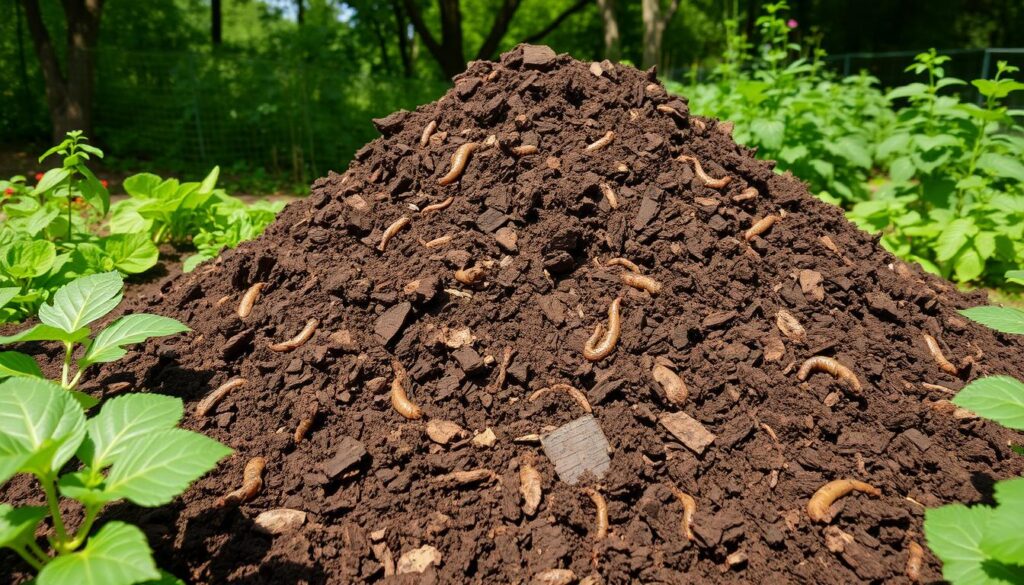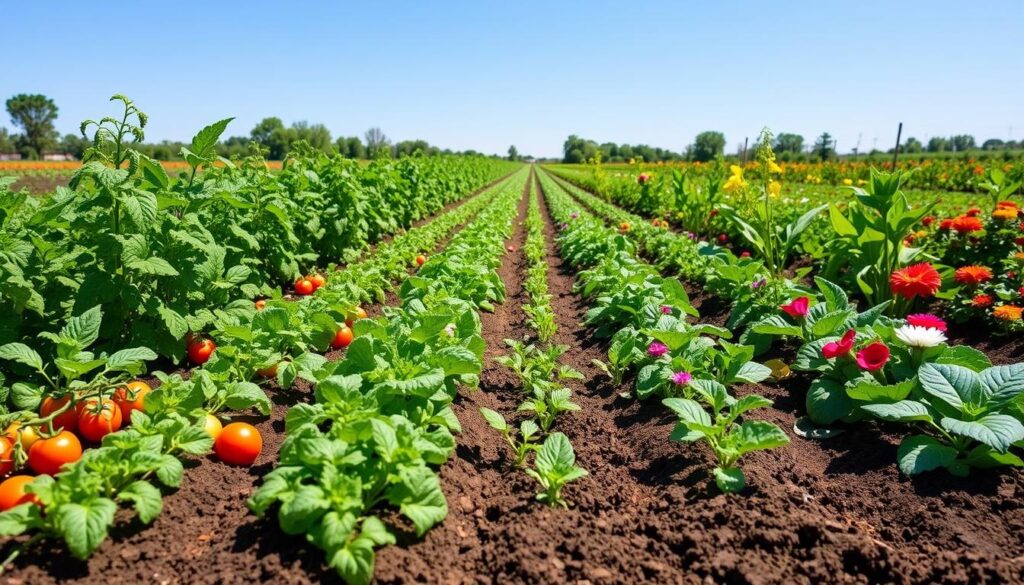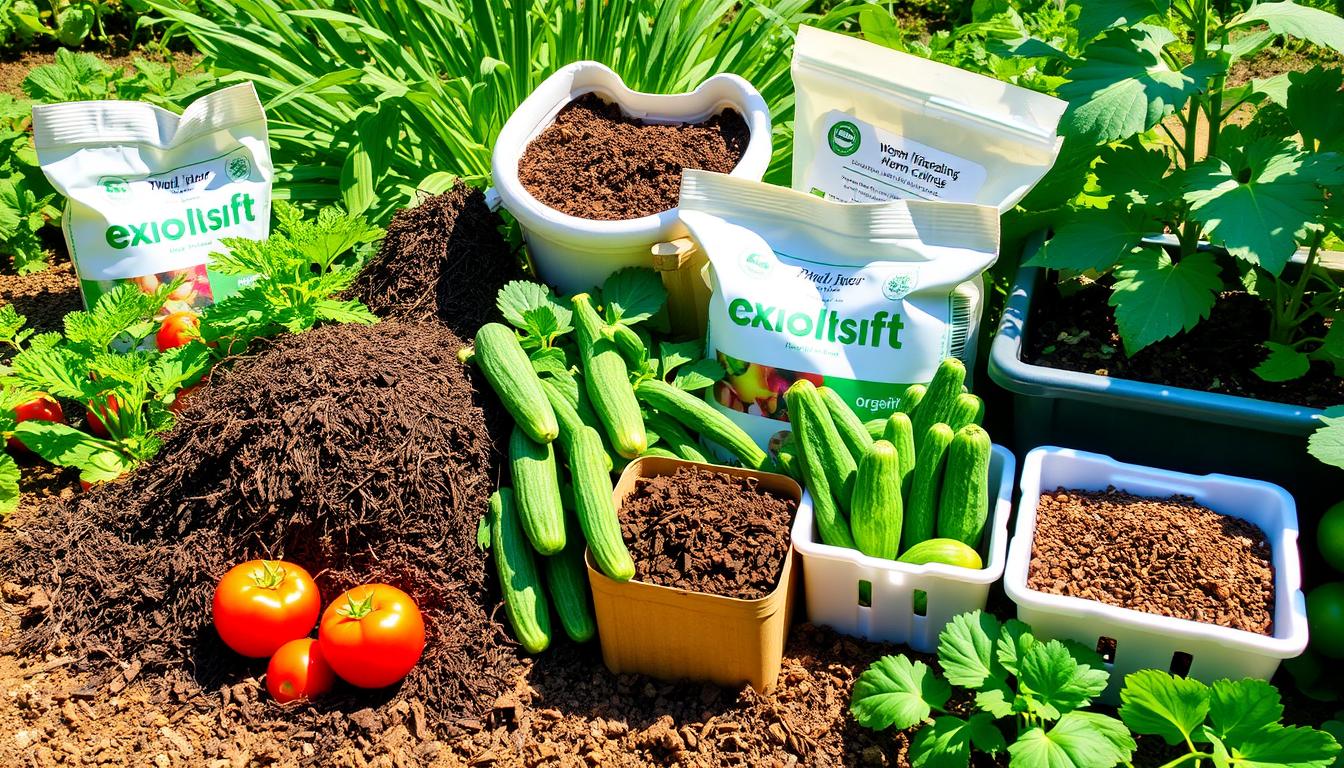In this guide, I’ll show you the best organic fertilizers for your garden. We’ll cover compost, aged manure, seaweed extracts, and homemade blends. Each has its own benefits for soil health and boosting your harvest.
Whether you’re new to gardening or have experience, you’ll find useful tips here. These will help make your garden healthier and more productive.
Key Takeaways
- Discover the top organic fertilizers for a thriving vegetable garden
- Understand the benefits of organic gardening and soil health
- Learn how to effectively use compost, aged manure, and other natural amendments
- Explore homemade fertilizer recipes and applications
- Implement crop rotation and other strategies for sustainable vegetable production
Introduction to Organic Fertilizers
Organic fertilizers are a big deal for gardening that’s good for the planet. They come from plants and animals and are better than synthetic ones. As someone who loves organic gardening, I’m eager to share why these fertilizers are the best for your garden.
Why Choose Organic Fertilizers?
Organic fertilizers are great because they feed your soil, not just your plants. They give nutrients slowly, so plants get what they need without harming the soil. This way, your soil gets healthier over time, making your garden strong and natural.
Benefits of Organic Gardening
- Soil gets better, holding water and nutrients better
- They’re good for the environment, not polluting
- Your organic vegetables taste better and are more nutritious
- Plants are healthier, fighting off pests and diseases better
Using organic fertilizers helps your garden and the planet. It’s good for you and the Earth.
Compost: The Foundation of Organic Fertilizers
Compost is key to a good organic garden. It’s made from broken-down organic stuff like food scraps and yard waste. Adding compost to your garden makes the soil better at holding water and nutrients.
Using compost makes your soil healthier and more fertile. As it breaks down, it gives plants the nutrients they need. This also helps good bugs in the soil grow, making your garden even better.
Making your own homemade compost is easy and fun. You just need to mix different organic stuff right. Make sure you have the right mix of materials and enough air and water.
- Gather a variety of organic materials, such as:
- Fruit and vegetable scraps
- Shredded paper and cardboard
- Dried leaves and plant trimmings
- Grass clippings
- Coffee grounds and filters
- Create a compost pile or bin, layering the different materials to maintain the optimal carbon-to-nitrogen ratio.
- Regularly turn and mix the compost to ensure proper aeration and decomposition.
- Monitor the moisture levels, adding water as needed to keep the compost moist but not waterlogged.
- Allow the compost to fully mature over the course of several months, until it transforms into a rich, crumbly, nutrient-rich material.
Adding compost to your garden gives plants the nutrients they need. It also makes the soil healthier. This organic fertilizer is essential for a successful organic garden.
Aged Manure: A Rich Source of Nutrients
Aged manure is a great organic fertilizer for vegetable gardens. It adds essential nutrients to the soil. This makes the soil better and helps good bacteria grow, helping your plants do well.
Choosing the Right Manure
It’s important to pick the right manure for your garden. Cow, horse, sheep, and chicken manure are all good choices. Each has different nutrients. For example, chicken manure has more nitrogen, while cow and horse manure are more balanced.
Aging and Composting Manure
To use manure safely in your garden, age and compost it first. Fresh manure can have too much ammonia and harmful bacteria. Aging and composting it makes it safe and full of nutrients.
- Start by letting the manure age for at least 6 months. Turn it often to help it decompose evenly.
- After aging, add materials like shredded leaves or straw to compost it. This balances the nutrients and makes it a great soil amendment.
- After 3-6 months of composting, your manure is ready to use in your garden as a soil amendment.
| Manure Type | Nitrogen | Phosphorus | Potassium |
|---|---|---|---|
| Cow | 0.5-0.9% | 0.2-0.6% | 0.4-1.0% |
| Horse | 0.3-0.7% | 0.2-0.5% | 0.3-0.6% |
| Sheep | 0.7-1.0% | 0.3-0.5% | 0.5-0.7% |
| Chicken | 1.0-1.5% | 0.5-1.0% | 0.5-1.0% |
Using aged manure in your garden gives your plants lots of nutrients. It also makes the soil better and helps good bacteria grow. This way of gardening is good for your plants and the soil in the long run.

Green Manures and Cover Crops
Improving your vegetable garden soil is key for a healthy harvest. Growing green manures and cover crops is a great way to do this. These plants add organic matter and nutrients to the soil, making it better for your garden.
Popular Green Manure Options
There are many good green manure options. Some top choices include:
- Legumes like clover, alfalfa, and vetch, which fix nitrogen from the air and add it to the soil.
- Grasses such as annual ryegrass, oats, and winter rye, which add a lot of organic matter and improve soil structure.
- Brassicas like mustard and radish, which help control weeds and pests and improve soil nutrients.
Choosing and using these green manure plants can greatly improve your soil. It boosts soil improvement, nitrogen fixation, and organic matter. This leads to healthier, more productive plants.
Green manures and cover crops are very versatile. You can plant them between crops, as a living mulch, or as a dedicated cover crop. Adding these plants to your garden is a smart way to care for your soil and enjoy a rich harvest.
Seaweed and Kelp Fertilizers
Seaweed and kelp fertilizers are great for your vegetable garden. They come from the sea and are full of nutrients and growth helpers. These can make your plants healthier and stronger.
Seaweed fertilizers come from sea algae. They have lots of minerals like iron and zinc. These help plants grow strong roots and leaves. They also have hormones that make plants grow faster.
Kelp fertilizers come from brown algae. They have nutrients like potassium and amino acids. These improve soil and make plants more resilient.
Using seaweed and kelp fertilizers is good for nutrient-rich and organic gardening. They are natural and don’t have harmful chemicals. They help your soil stay healthy for a long time.
Both seaweed and kelp fertilizers are great for your garden. They help plants grow well. By using them, you can get more and better food for your family and community.
The Best Organic Fertilizers for Vegetable Gardens
Choosing the right organic fertilizers is key for a thriving vegetable garden. These fertilizers not only feed your plants but also make the soil healthier. Let’s look at some of the best organic fertilizers for your garden.
Compost is a top choice for many gardeners. It’s made from broken-down organic matter and is full of nutrients. It also makes the soil better at holding water and air, perfect for growing veggies.
Aged manure is another great option. It’s rich in nitrogen, phosphorus, and other nutrients. But, make sure to pick the right type and that it’s been composted well to avoid problems.
- Chicken manure: High in nitrogen, great for leafy greens and brassicas
- Cow manure: Well-balanced nutrient profile, suitable for a wide range of vegetables
- Sheep manure: Nutrient-dense, ideal for root crops and nightshade vegetables
Green manures and cover crops are also great. They help fix nitrogen and make the soil better. Clover, alfalfa, and buckwheat are popular choices.
Seaweed and kelp-based fertilizers are also excellent. They come from the sea and are full of nutrients and hormones. These can help your plants grow stronger and more resilient.
| Organic Fertilizer | Key Nutrients | Best Uses |
|---|---|---|
| Compost | Balanced nutrient profile | General vegetable garden |
| Aged Manure | Nitrogen, Phosphorus, Potassium | Root crops, leafy greens, nightshades |
| Green Manures | Nitrogen fixation | Improve soil fertility and structure |
| Seaweed/Kelp | Micronutrients, hormones | Enhance plant growth and vigor |
Using these top organic fertilizers in your garden will feed your plants and improve the soil. This will lead to a bountiful harvest of fresh, tasty veggies.
Making Your Own Organic Fertilizer Mixes
Creating your own organic fertilizer mixes is rewarding and saves money. You can use common household items to make nutrient-rich soil amendments. These amendments feed your plants and improve your garden’s health.
Ingredients for Homemade Fertilizers
There are many effective ingredients for homemade organic fertilizers. Some top choices include:
- Compost: A key part of organic gardening, compost is full of nutrients and beneficial microorganisms.
- Aged manure: Rich in nitrogen, phosphorus, and potassium, aged manure is great for homemade mixes.
- Coffee grounds: High in nitrogen, coffee grounds are a great soil amendment.
- Eggshells: Crushed eggshells add calcium, essential for plant growth.
- Banana peels: A natural source of potassium, banana peels help with lush foliage and big harvests.
Recipes and Ratios
When making your own fertilizer mixes, it’s key to balance nutrients. Try a 2-1-2 ratio of bone meal, greensand, and alfalfa meal. Adjust the mix based on your plants’ needs and soil type.
| Ingredient | Nutrient Contribution | Application Rate |
|---|---|---|
| Compost | Balanced Nutrition | 2-4 inches mixed into the soil |
| Aged Manure | Nitrogen, Phosphorus, Potassium | 1/2 – 1 inch mixed into the soil |
| Coffee Grounds | Nitrogen | 1/2 cup per plant, worked into the soil |
| Crushed Eggshells | Calcium | 1/2 cup per plant, mixed into the soil |
| Banana Peels | Potassium | 1 peel per plant, buried near the roots |
Try different homemade organic fertilizers to create custom blends for your garden. DIY gardening is fun and rewarding. Watch your vegetables grow strong with these nutrient-rich soil amendments.
“Homemade organic fertilizers not only nourish your plants but also reduce waste and benefit the environment.”
Applying Organic Fertilizers Effectively
Getting the most from your organic fertilizers starts with proper application. Whether you’re using compost, aged manure, or a custom mix, timing and frequency matter a lot.
Timing Your Fertilizer Applications
When you apply organic fertilizers can greatly affect how well plants grow. For most plants, the best time is during their active growing season. This means early spring or late fall for cool-season veggies, and mid-spring to midsummer for warm-season ones.
It’s also key to match your fertilizer applications with your plants’ growth stages. Use a nitrogen-rich fertilizer like compost or seaweed extract at the start of the season for leaf growth. Then, switch to a fertilizer rich in phosphorus and potassium when plants start flowering and fruiting.
Frequency of Fertilizer Applications
- Compost and aged manure: Use these slow-release fertilizers once or twice a year, in spring and fall.
- Quick-release fertilizers: Use these, like fish emulsion or bone meal, every 4-6 weeks when plants are growing.
- Green manures and cover crops: Add these to your soil once a year, in fall or early spring.
The how often you apply fertilizers depends on your plants’ needs, the fertilizer type, and how fast it releases nutrients. Watching how your plants grow and the health of your soil will help you adjust your fertilizing schedule for the best results.
“Applying organic fertilizers at the right time and frequency is just as important as choosing the right products. By getting the timing and application right, you can ensure a bountiful, nutrient-rich harvest from your vegetable garden.”
Crop Rotation and Soil Health
Keeping your vegetable garden’s soil healthy is key for organic gardening success. Crop rotation is a top way to do this. It helps add nutrients, breaks pest and disease cycles, and makes your garden more sustainable.
By changing where you plant your vegetables each season, you balance soil nutrients. This stops the same nutrients from getting used up. It keeps your soil’s nutrient cycling in check, helping your veggies grow well.
- Legumes like peas and beans add nitrogen, helping other plants that need it.
- Root veggies like carrots and radishes loosen the soil, making it ready for other plants.
- Brassicas like broccoli and kale fight off diseases and pests, keeping your organic vegetable gardens healthy.
Using crop rotation in your organic gardening boosts your soil health. It also makes your vegetable gardens more sustainable. This way of gardening leads to big harvests and keeps your soil healthy for years.

Troubleshooting Common Issues
Even the most careful organic gardeners might face problems like nutrient deficiencies. These issues can affect your vegetable garden. Knowing the signs and causes helps you fix them with the right organic fertilizers and amendments.
Nutrient Deficiencies and Solutions
Nutrient problems in your plants show up in different ways. You might see yellow leaves, slow growth, or less fruit. Common issues include a lack of nitrogen, phosphorus, and potassium, plus micronutrients like iron and magnesium.
To find and fix these problems, start with a soil test. This will show you what nutrients your soil is missing. Then, use organic fertilizers like compost or manure to add back what’s needed. This will help your plants get healthy again.
For instance, if your soil lacks nitrogen, use alfalfa meal or composted poultry manure. Phosphorus can be added with rock phosphate or bone meal. Potassium needs can be met with kelp extracts or greensand. By watching your plants and making the right changes, your garden will do well all season.



Leave a Reply